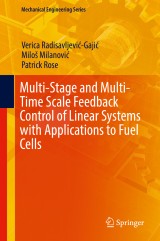Details

Multi-Stage and Multi-Time Scale Feedback Control of Linear Systems with Applications to Fuel Cells
Mechanical Engineering Series
|
96,29 € |
|
| Verlag: | Springer |
| Format: | |
| Veröffentl.: | 12.02.2019 |
| ISBN/EAN: | 9783030103897 |
| Sprache: | englisch |
Dieses eBook enthält ein Wasserzeichen.
Beschreibungen
<p>This book provides a comprehensive study of multi-stage and multi-time scale design of feedback controllers for linear dynamic systems. It examines different types of controllers as can be designed for different parts of the system (subsystems) using corresponding feedback gains obtained by performing calculations (design) only with subsystem (reduced-order) matrices.The advantages of the multi-stage/multi-time scale design are presented and conditions for implementation of these controllers are established. Complete derivations and corresponding design techniques are presented for two-stage/two-time-scale, three-stage/three-time scale, and four-stage/four-time-scale systems. The techniques developed have potential applications to a large number of real physical systems. The design techniques are demonstrated on examples of mathematical models of fuel cells, especially the proton exchange membrane fuel cell.</p>
<p><br></p>
<p><br></p>
Introduction.- Continuous-Time Two-Stage Feedback Controller Design.- Discrete-Time Two-Stage Feedback Controller Design.- Three-Stage Continuous-Time Feedback Controller Design.- Three-Stage Discrete-Time Feedback Controller Design.- Four-Stage Continuous-Time Feedback Controller Design.- Modelling and System Analysis of PEM Fuel Cells.- Control of a Hydrogen Gas Processing System.- Extensions to Multi-Stages and Multi-Time Scale.- References.- Index.
<div>Dr. Verica Radisavljevic-Gajic is an Assistant Professor in the Department of Mechanical Engineering at Villanova University. Mr. Milos Milanovic is a graduate student in the Department of Mechanical Engineering at Villanova University. Mr. Patrick Rose is a graduate student in the Department of Mechanical Engineering at Villanova University. Dr. Garrett Clayton is an Associate Professor in the Department of Mechanical Engineering at Villanova University.</div><div><br></div>
This book provides a comprehensive study of multi-stage and multi-time scale design of feedback controllers for linear dynamic systems. It examines different types of controllers as can be designed for different parts of the system (subsystems) using corresponding feedback gains obtained by performing calculations (design) only with subsystem (reduced-order) matrices.The advantages of the multi-stage/multi-time scale design are presented and conditions for implementation of these controllers are established. Complete derivations and corresponding design techniques are presented for two-stage/two-time-scale, three-stage/three-time scale, and four-stage/four-time-scale systems. The techniques developed have potential applications to a large number of real physical systems. The design techniques are demonstrated on examples of mathematical models of fuel cells, especially the proton exchange membrane fuel cell.<div><ul><li>Explains how different types of controllers can be designed for different parts of the system (subsystems) using feedback gains obtained by calculations (design) with only subsystem (reduced‐order) matrices;<br></li><li>Illustrates a reduction of computational requirements because all numerical operations are done with matrices of the reduced‐order corresponding to the subsystems;<br></li><li>Details how very accurate computations are performed with well‐conditioned lower‐order matrices;<br></li><li>Discusses steps to facilitate robustness and reliability as well as improved feedback control loop security, important for cyber physical systems.<br></li></ul></div>
Explains how different types of controllers can be designed for different parts of the system (subsystems) using feedback gains obtained by calculations (design) with only subsystem (reduced-order) matrices; Illustrates a reduction of computational requirements because all numerical operations are done with matrices of the reduced-order corresponding to the subsystems; Details how very accurate computations are performed with well-conditioned lower-order matrices; Discusses steps to facilitate robustness and reliability as well as improved feedback control loop security, important for cyber physical systems
Diese Produkte könnten Sie auch interessieren:

High-Frequency Oscillator Design for Integrated Transceivers

von: J. van der Tang, Dieter Kasperkovitz, Arthur H.M. van Roermund

149,79 €















